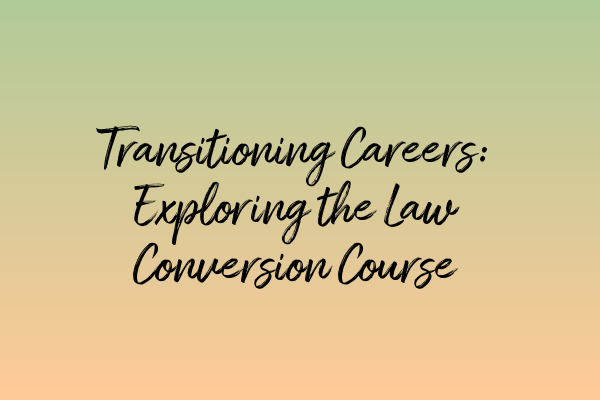Transitioning Careers: Exploring the Law Conversion Course
Are you considering a career change into the legal profession? If so, you may have come across the term “Law Conversion Course” or “Graduate Diploma in Law” (GDL). This comprehensive course is designed for individuals who hold a non-law degree and wish to qualify as solicitors or barristers. In this blog post, we will delve into the ins and outs of the Law Conversion Course, its benefits, and why it may be the right path for you.
What is a Law Conversion Course?
A Law Conversion Course is a postgraduate level program that allows graduates from various disciplines to gain the necessary legal knowledge and skills required for a successful legal career. It serves as a bridge between your existing degree and the legal profession, allowing you to transition into law without having to start from scratch.
Why Choose a Law Conversion Course?
There are several reasons why the Law Conversion Course may be a suitable choice for those looking to switch careers:
1. Broaden your skillset: Regardless of your previous academic background, the Law Conversion Course equips you with a wide range of legal skills. From legal research and analysis to drafting legal documents, you’ll develop the foundational skills needed to succeed in the legal profession.
2. Open doors to varied career opportunities: A law degree is highly versatile and can open doors to a multitude of career pathways. Whether you aspire to become a solicitor, barrister, or pursue a career in legal research, policy-making, or advocacy, the Law Conversion Course is the first step towards achieving your goals.
3. Intellectual challenge and personal growth: Studying law requires critical thinking, analytical skills, and intellectual rigor. If you crave mental stimulation and continuous learning, the Law Conversion Course will provide the perfect environment for personal and professional growth.
4. Exciting and dynamic field: The law is ever-evolving, and studying law can offer a stimulating and dynamic career. Each case and client present new challenges, making the practice of law an endlessly exciting journey.
What Does the Law Conversion Course Cover?
The Law Conversion Course covers the core areas of law that you would typically study during an undergraduate law degree. These subjects include contract law, criminal law, equity and trusts, constitutional law, and land law, among others. Through lectures, tutorials, and practical exercises, you will gain a comprehensive understanding of the UK legal system and its key principles.
The Structure of the Law Conversion Course
The Law Conversion Course is usually completed on a full-time basis in one year, or part-time over two years. The course is composed of a series of modules, each focusing on a specific area of law. At the end of each module, you will be assessed through examinations, coursework, or a combination of both.
The Importance of Work Experience
While the Law Conversion Course provides you with the necessary legal knowledge, gaining practical experience is essential to becoming a competent legal professional. Many law firms and chambers value work experience highly, and it can significantly increase your chances of securing a training contract or pupillage.
As you progress through the Law Conversion Course, it’s crucial to seek out opportunities to gain practical experience. Apply for internships, legal clinics, or volunteer at law firms to enhance your understanding of the legal profession and build connections within the industry.
Next Steps: SQE and Professional Qualification
Upon completing the Law Conversion Course, you will still need to undertake the Solicitors Qualifying Examination (SQE) to qualify as a solicitor. The SQE replaces the traditional Legal Practice Course (LPC) and is divided into two stages. Stage 1 assesses legal knowledge and understanding, while Stage 2 focuses on practical legal skills.
Once you have successfully completed the SQE, you will be eligible to apply for a training contract with a law firm or pupillage at a barristers’ chambers. These practical training periods provide the hands-on experience necessary to qualify as a solicitor or barrister.
Conclusion
Transitioning into a legal career through the Law Conversion Course can be a challenging yet rewarding journey. It offers individuals with non-law degrees the opportunity to delve into the exciting world of law and opens doors to a wide range of legal career paths.
If you’re considering a career change, the Law Conversion Course could be the perfect stepping stone for you. By acquiring legal knowledge, developing essential skills, and gaining practical experience, you’ll be well-prepared to embark on a successful legal career.
Related Articles:
– Magistrates’ Court vs Crown Court: Understanding Key Differences
– Protecting Vulnerable Witnesses in Criminal Trials: Best Practices and Legal Safeguards
– Unraveling the Complexities of UK Bail Laws
– Remand in Custody: Understanding Detention Prior to Trial
– SQE Criminal Law: The Future of Legal Education and Practice


Leave a Reply